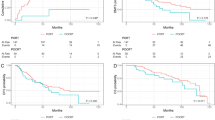Abstract
Purpose
To determine through the analysis of our multi-institutional database whether postoperative adjuvant chemotherapy for upper urinary tract carcinoma with localized invasive upper urinary tract carcinoma (UUTC) is beneficial.
Methods
A study population of 93 patients with pT3N0/xM0 UUTC was eligible for this study. Clinical features evaluated were sex, tumor location, adjuvant chemotherapy status, tumor pathology (histology, grade, infiltrating growth, lymphovascular invasion (LVI)), and cause of death. Cancer-specific survival (CSS) was estimated by Kaplan–Meier method. Prognostic factors related to CSS were analyzed by Cox proportional hazards regression model for multivariate analysis.
Results
In pT3 patients, overall 5-year CSS rate was 68.4% and median CSS time was 31 months (range 3–114 months). In the adjuvant chemotherapy group, 5-year CSS rate was 80.8%, whereas 5-year CSS rate was 64.4% in the non-adjuvant chemotherapy group. By multivariate analysis, adjuvant chemotherapy status was significantly associated with CSS (P = 0.008) were sex, tumor grade, tumor histology, and LVI presence.
Conclusions
This study, although it was retrospective study, revealed that adjuvant chemotherapy after RNU may be beneficial in pT3N0/X patients by multivariate analysis. Prospective studies evaluating adjuvant therapy regimens for UTTC are required.

Similar content being viewed by others
Abbreviations
- UUT:
-
Upper urinary tract
- CT:
-
Computed tomography
- MRI:
-
Magnetic resonance imaging
- RNU:
-
Radical nephroureterectomy
- UUTC:
-
Carcinoma of upper urinary tract
- CSS:
-
Cancer-specific survival
- RFS:
-
Recurrence-free survival
- AJCC:
-
The American Joint Committee on Cancer
- UICC:
-
Union Internationale Contre le Cancer
- LVI:
-
Lymphovascular invasion
- INF:
-
Infiltrating growth
- eGFR:
-
Estimated glomerular filtration rate
- M-VAC:
-
Methotrexate, vinblastine, doxorubicin, and cisplatin
- GC:
-
Gemcitabine and cisplatin
- MEC:
-
Methotrexate, epirubicin, and cisplatin
- MEN:
-
Methotrexate, epirubicin, and nedaplatin
- HR:
-
Hazard ratio
- CI:
-
Confidence interval
References
Raman JD, Scherr DS (2007) Management of patients with upper urinary tract transitional cell carcinoma. Nat Clin Pract Urol 4:432–443
Hall MC, Womack S, Sagalowsky AI et al (1998) Prognostic factors, recurrence, and survival in transitional cell carcinoma of the upper urinary tract: a 30-year experience in 252 patients. Urology 52:594–601
Michael M, Tannock IF, Czaykowski PM et al (1998) Adjuvant chemotherapy for high-risk urothelial transitional cell carcinoma: the Princess Margaret Hospital experience. Br J Urol 82:366–372
Lee SE, Byun SS, Park YH et al (2006) Adjuvant chemotherapy in the management of pT3N0M0 transitional cell carcinoma of the upper urinary tract. Urol Int 77:22–26
Hellenthal NJ, Shariat SF, Margulis V et al (2009) Adjuvant chemotherapy for high risk upper tract urothelial carcinoma: results from the Upper Tract Urothelial Carcinoma Collaboration. J Urol 182:900–906
Greene FL, Page DL, Fleming ID et al (2002) American Joint Committee on Cancer (AJCC) staging manual, 6th edn. Springer, Philadelphia
Mostofi FK, Sobin LH, Torioni H (1973) Histological typing of urinary bladder tumors. World Health Organization, Geneva
Matsuo S, Imai E, Horio M et al (2009) Revised equations for estimated GFR from serum creatinine in Japan. Am J Kidney Dis 53:982–992
Lane BR, Smith AK, Larson BT et al (2010) Chronic kidney disease after nephroureterectomy for upper tract urothelial carcinoma and implications for the administration of perioperative chemotherapy. Cancer 15:2967–2973
Park S, Hong B, Kim CS et al (2004) The impact of tumor location on prognosis of transitional cell carcinoma of the upper urinary tract. J Urol 171:621–625
Kim DS, Lee YH, Cho KS et al (2010) Lymphovascular invasion and pT stage are prognostic factors in patients treated with radical nephroureterectomy for localized upper urinary tract transitional cell carcinoma. Urology 75:328–332
Bamias A, Deliveliotis Ch, Fountzilas G et al (2004) Adjuvant chemotherapy with paclitaxel and carboplatin in patients with advanced carcinoma of the upper urinary tract: a study by the Hellenic Cooperative Oncology Group. J Clin Oncol 22:2150–2154
Bolenz C, Fernández MI, Trojan L et al (2008) Lymphovascular invasion and pathologic tumor stage are significant outcome predictors for patients with upper tract urothelial carcinoma. Urology 72:364–369
Novara G, Matsumoto K, Kassouf W et al (2010) Prognostic role of lymphovascular invasion in patients with urothelial carcinoma of the upper urinary tract: an international validation study. Eur Urol 57:1064–1071
Kikuchi E, Margulis V, Karakiewicz PI et al (2008) Lymphovascular invasion predicts clinical outcomes in patients with node-negative upper tract urothelial carcinoma. J Clin Oncol 27:612–618
Kondo T, Nakazawa H, Ito F et al (2007) Impact of the extent of regional lymphadenectomy on the survival of patients with urothelial carcinoma of the upper urinary tract. J Urol 178:1212–1217
Roscigno M, Shariat SF, Margulis V et al (2009) Impact of lymph node dissection on cancer specific survival in patients with upper tract urothelial carcinoma treated with radical nephroureterectomy. J Urol 181:2482–2489
Acknowledgments
The authors wish to thank the investigators, their staff, and the affiliated institutions for the important contribution to this study in The Osaka Urinary Tract Urothelial Carcinoma Collaboration Group: Kensaku Nishimura, Susumu Miyoshi, (Osaka Rosai Hospital); Ken Takeda, (Osaka Medical Center for Cancer and Cardiovascular Diseases); Seiji Yamaguchi, (Osaka General Medical Center Hospital); Yoichi Shiotsuka, Shigeru Nakamori, (Higashiosaka City General Hospital); Toshiaki Yoshioka, (Sumitomo Hospital); Satoko Fukuda, Tsuneo Hara, (Ikeda Municipal Hospital); Hideki Sugao, (Minoh City Hospital); Mototaka Sato, Koji Hatano, Masatoshi Mukai, Akira Nagahara, Motohide Uemura, Daizo Oka, (Osaka University).
Conflict of interest
There are no sources of support to declare, and no author has any financial disclosures or conflicts of interest to declare.
Author information
Authors and Affiliations
Corresponding author
Rights and permissions
About this article
Cite this article
Kawashima, A., Nakai, Y., Nakayama, M. et al. The result of adjuvant chemotherapy for localized pT3 upper urinary tract carcinoma in a multi-institutional study. World J Urol 30, 701–706 (2012). https://doi.org/10.1007/s00345-011-0775-z
Received:
Accepted:
Published:
Issue Date:
DOI: https://doi.org/10.1007/s00345-011-0775-z




